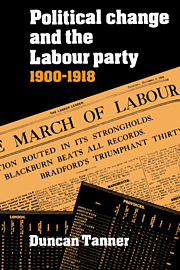Book contents
- Frontmatter
- Contents
- List of tables
- Preface
- Abbreviations
- Introduction
- PART I POLITICS AT THE CENTRE
- PART II POLITICS IN THE CONSTITUENCIES
- 4 The electoral framework of Edwardian politics
- 5 The North-West
- 6 The Tory regions
- 7 The coalfields
- 8 The heavy industrial heartlands
- 9 Yorkshire
- 10 Liberalism's reserve army
- PART III AN INTEGRATED PICTURE
- PART IV THE POLITICS OF CHANGE
- CONCLUSION
- APPENDICES
- Bibliography
- Index
8 - The heavy industrial heartlands
Published online by Cambridge University Press: 24 October 2009
- Frontmatter
- Contents
- List of tables
- Preface
- Abbreviations
- Introduction
- PART I POLITICS AT THE CENTRE
- PART II POLITICS IN THE CONSTITUENCIES
- 4 The electoral framework of Edwardian politics
- 5 The North-West
- 6 The Tory regions
- 7 The coalfields
- 8 The heavy industrial heartlands
- 9 Yorkshire
- 10 Liberalism's reserve army
- PART III AN INTEGRATED PICTURE
- PART IV THE POLITICS OF CHANGE
- CONCLUSION
- APPENDICES
- Bibliography
- Index
Summary
The areas adjacent to the coalfields were as much a part of the Liberals' working-class political base in the 1890s as the coalfield seats themselves. There was a large number of seats on the edge of the North-East and South Wales coalfields which were dominated by iron and steel, docking, shipbuilding, and heavy engineering. Mining was an important supplementary occupation. In many of these seats, trade unions were extremely strong, and workplace relations and conditions were harsh. ‘Culturalist’ interpretations of Labour's success – and historical hindsight – would suggest that the Liberals would inevitably decline and be replaced by Labour in seats with these social/economic characteristics.
The reality was different. Labour did not dominate the area's politics. Although the Conservatives were not the dominant force in the area, they were far stronger than Labour, particularly in the dockland areas and in some of the steel and shipbuilding towns. While the Tories' support was in part related to a Protestant hostility to the Irish, there was more to it than this. Employment and prosperity in some areas depended on the production of equipment/arms for the military services. Tory employers controlled the prosperity of whole sections of urban constituencies. Economic interest and economic dependency combined with a hostility to outsiders (especially if it was felt they might take employment from the local workforce). Social conservatism and an affinity with the Tories' very masculine views on several other issues (particularly drink) made North-East working-class Conservatism a resilient force.
- Type
- Chapter
- Information
- Political Change and the Labour Party 1900–1918 , pp. 227 - 248Publisher: Cambridge University PressPrint publication year: 1990



